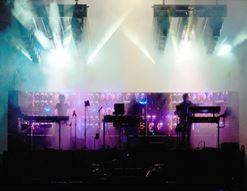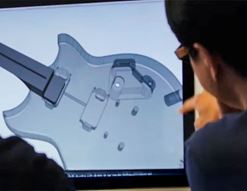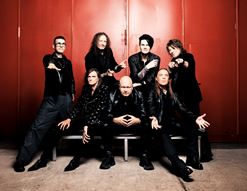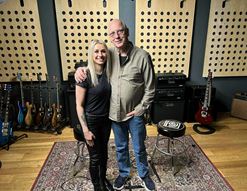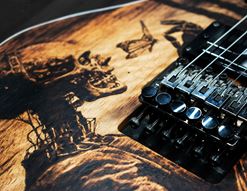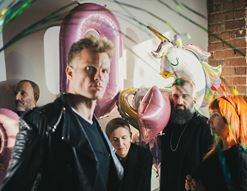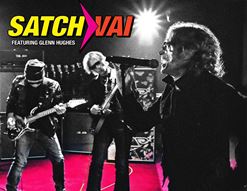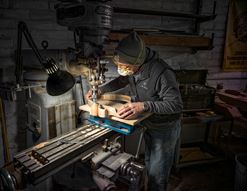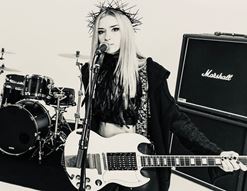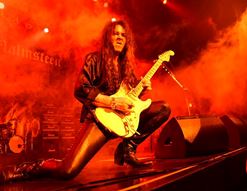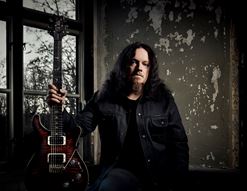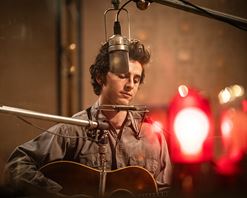Nick Johnston is full of surprises.
He makes beautiful, expressive music that straddles many stylistic worlds but always keeps a distinctive touch; he is a player’s player who has a very healthy perspective on the guitar; and he is a delightfully honest, fun and intelligent person to converse with.
When we recently chatted over Zoom, he surprised me quite often with his approach to music and everything that goes along with it. I must stress that it was all quite positive - Nick’s a lovely person to chat to - but he’s almost nothing like any other player I’ve interviewed. Why? It’s maybe easier for that to unravel as you read through the interview transcription, but suffice to say, I came away from our memorable and enjoyable conversation with a distinctly different impression of him than the one I had going in!
In our exclusive chat, we cover his writing process, his early days as a musician, his thoughts on social media and the story of how he came to be one of Schecter’s most popular endorsees. He talks about influences and fields plenty of questions about his wonderful signature guitars. For fans of his music, this is hopefully an enlightening article. For those who don’t know his work, have a read anyway: you might find yourself becoming a fan along the way…
Nick Johnston Interview
guitarguitar: So I guess a good place to start would be: what first inspired you to pick up the guitar?
Nick Johnston: Right, well it kinda stems back to when I was really young, I wanted a guitar. Maybe 7, 6 years old or something, But my parents (laughs) in their infinite wisdom, said they don’t make guitars for left-handed people. Then, years later, I had a neighbour who I looked up to, who had a guitar.. One day I knocked on his door and asked if I could watch him play, and at one point he said, ‘Okay, you just hit the string and move your finger’. I was like, ‘Woah man!’ I was mediocre at everything I’d done previous to that. As a Canadian, of course, I played hockey and skateboarding but guitar was the first thing where I ‘got it’. You see it happening with people you know, when they get into cooking or fitness: to them, they just sorta see the thing and connect, right? For me, the guitar was like that. After two weeks, I could pretty much play anything I wanted!
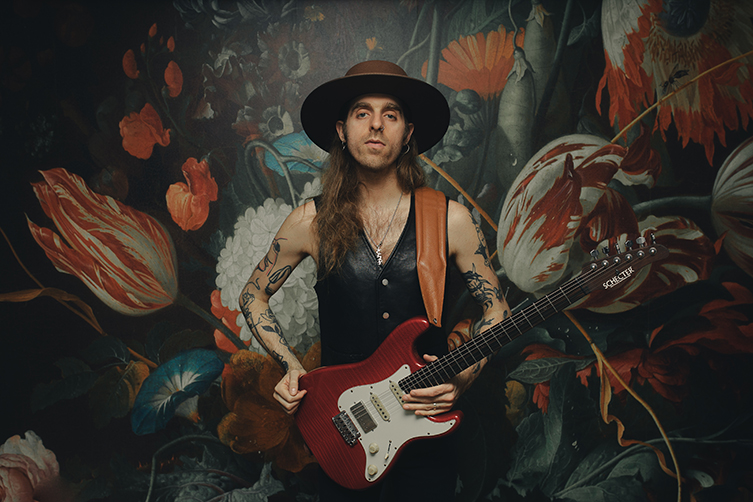
GG: Wow!
NJ: Yeah.
GG: So, it was actually kinda like the idea of playing the instrument and maybe the interaction with it, more than seeing Kurt Cobain or whomever else and saying, ‘I want to do that’?
NJ: No, it’s never been about that for me. There’s never enough, if that makes any sense? I never really used that as ammunition for when I had to sit down and, you know…those 8 hour days I used to do were driven solely by my obsession about getting better. It was always about ‘this makes me feel good, I can connect these dots’.
GG: Ah, that’s really interesting! Not only the 8 hour practice sessions, but the motivation behind it being your love for what you were doing and your desire to improve. Forgive the name drop here, but I asked Steve Vai about his famous discipline recently and he said, ‘Ray, I don’t have any discipline: if I don’t love what I’m doing, I simply can’t do it’. His 8 hour practice sessions were born out of a love for doing it, which sounds similar to what you’re saying too. Was it an inner need to learn more?
NJ: Yeah! I’m 36 now, so if I try to go back to when I was 15, I mean, I was just a stupid kid (laughs). I was awkward, and confused, you know, a teenager! No confidence etc etc but there was this thing that I could do alone in my room, and as I got better at it, I felt better. So that was enough. I didn’t want to play in a band, I didn’t want to tour, that didn’t matter. It was all driven by ‘this is helping me get through the most awkward years of anyone’s life (laughs). I grew up in a small town. I didn’t have videos, I didn’t know who Yngwie was, I didn’t know any of that stuff.
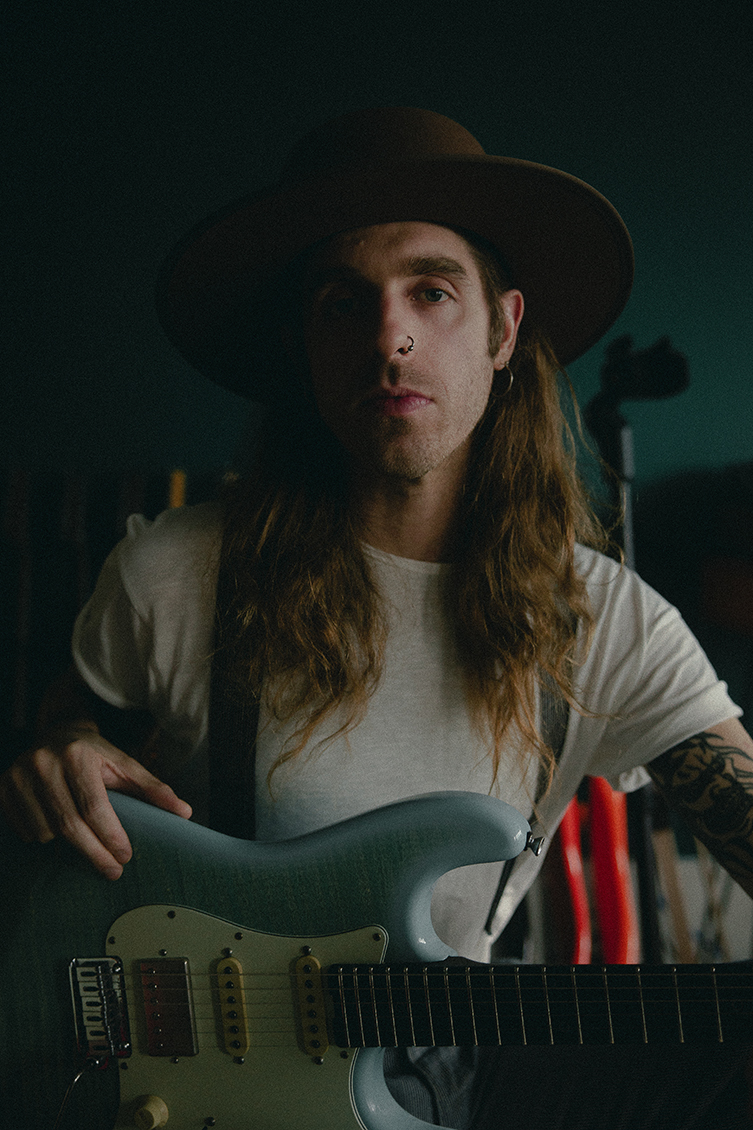
GG: Ok, and then as you played and improved, did you go through the whole playing with rock bands with your friends…
NJ: No.
GG: Not ever?
NJ: No, never played in a band. Never.
GG: No way! That’s interesting! In that case, it kind of dovetails into one of the things that I enjoy about your music, which is the compositional aspect. Rather than non-stop guitar, there’s a lot more happening, so I wondered: at what point in your musical genesis did you start composing music rather than just learning?
NJ: I remember I had…let me think about that, that’s a good question…back in 2001 or 2002, Korg put out a little machine called a PX4, I don’t know if you remember it?
GG: Was that one of the Pandora things?
NJ: No, it wasn’t a Pandora, it was a little square thing. Anyway, I had that, so I would make these little 4-track demos and there was a way to export them on a USB to a computer. So, as soon as I had that, that’s what I started doing. Once I had the capability of putting a rhythm part down, I’d put something over it, and listening back to yourself at that age was quite a novelty. I found myself playing for the ability and the understanding to be able to record. The idea of preserving things became the driving force, so I’d get better so I can play the stuff I was hearing in my brain. At this point, I was very technical: I could pretty much do the technique stuff that I still do know, but I just wanted to see if I could find an application for it. I went to the library to learn theory: I’d take books out and so on, but it’s been there since day one I guess. Since I’ve been able to record, writing’s been everything.
GG: So, how did you get from your home recordings to being an artist who is releasing music and becoming a well-known figure in the guitar world? There's a big gap there!
NJ: Well, I brought my first album out in 2010 or 2011 - it was a while ago now - and the whole point of putting that first record out was just learning the modern independent business. Ten years ago, in terms of social media platforms, it was a dark age, right?
GG: Yeah!
NJ: So, I just wanted to know how to do that. You know, can I do this part of it? Making that record was also like, how do I figure how much money it takes to make an album? How does it feel to release something and have people say things about it? All of this was a big learning curve and I wanted to experience that. I still don’t really know what I’m doing! But that plus an even bigger factor: I come from a very small town. I mean, a thousand people, nothing! And there was nobody else around, so I was like, ‘I can do this’.
GG: Okay.
NJ: I just learned how to keep doing it in the model I see comfortable for me, and then I met people over the years, different musicians I’ve been able to call on for help to either play or do this, that and the other thing. Then, you know, you just keep going!
GG: Just keep going!
NJ: Yeah!
GG: Do you know, one thing I didn't realise until you mentioned it there Nick, is that you’re left handed.
NJ: Yeah, I’m a lefty.
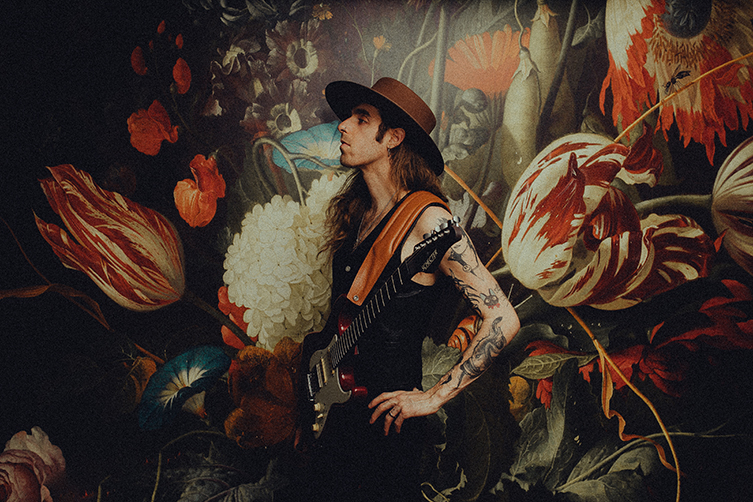
GG: So am I, and I play right handed, as you do. Do you think it’s a benefit or a hindrance to be playing a right-handed guitar effectively the wrong way round?
NJ: I’ve no idea. I’ve never known any other way. I tend to play more dominant left hand technical things, I guess, but I dunno: maybe my ear just likes that more? It’s probably impossible to tell. Some people might say that, essentially, your dominant hand’s on the fretboard so it’s easier to do certain things. Maybe!
GG: Yeah, fair enough! Personally, since that’s something we share, I noticed that whenI was learning, lots of fast stuff was easier but I also noticed that simple fingerpicking stuff was actually harder for me than for my right-handed friends.
NJ: Right! I never tried any of that stuff but I can imagine it being like that, yeah. I guess just in general - and this could also speak to my undisciplined practice routine - I have really bad picking. Maybe the sync between the two hands, I don’t know! Are there any really great left-handed alternate pickers, maybe? With a right picking hand. That’d be interesting.
"I never learned anybody's solos, I never learned a song, I never learned anybody's melodies, nothing."
GG: Well, I instantly thought of Robert Fripp. He’s left handed and he does some incredible string skipping things. But I digress, it was just if you noticed it.
NJ: It’s cool, it’s an interesting study.
GG: Indeed! So, with your music, I get a big kind of ‘cinematic’ feel. There’s a lot of interesting chord voicings that you use, that remind me of films and slightly more ‘magical' music than you’d typically get from a rock guitar instrumental musician. I wondered what your influences were when you were writing? You said you didn’t really have heroes when you were learning, but nobody lives in a vacuum: there must have been music that you loved and things that you wanted to incorporate into your music? Inspiration, I suppose I’m talking about?
NJ: I guess it depends…I’m assuming you mean my newer stuff?
GG: The last couple of albums, yeah.
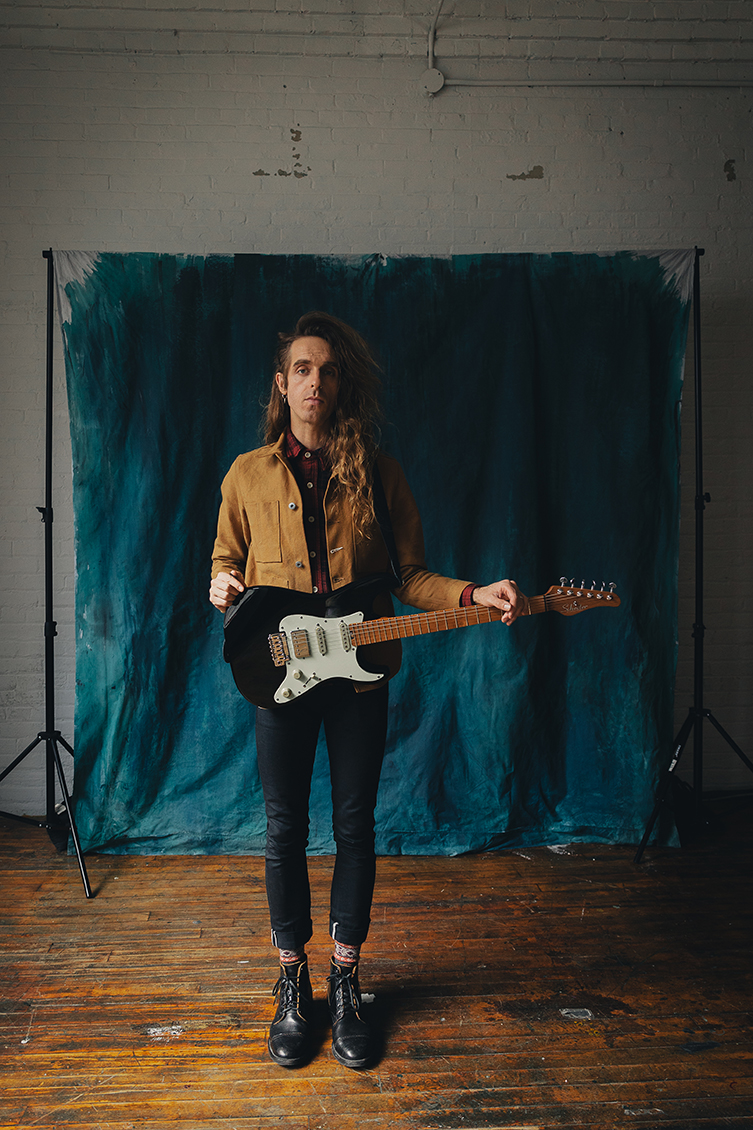
NJ: Okay. That stuff, I can’t tell you one guitar player who influenced that stuff because between you and me, I actually don’t listen to guitar music.
GG: It doesn’t have to be a guitarist, I just mean generally.
NJ: So, what I find is really interesting is the balance of always trying to be diatonic and non-diatonic while maintaining a very simple melody over the top of it. Whether or not this is something I’m going out of my way to do, or my ear’s just sort of wanting to go there, that’s up in the air. Also, too, I spend most of my time sitting at the piano. So, you immediately remove guitar from the equation, or at least I do. I much prefer writing and working on music on the piano. The way things are laid out makes more sense to me, I love the sound of some of the chords I go for, and I actually add the guitar at the very end of it: it’s the last thing I do. I guess I shouldn't say there’s no guitar player who inspired me, because there is one. I really like Pat Metheny.
GG: Oh yeah!
NJ: His 80s stuff has a little bit of a latin influence in it but there’s always this really interesting push and pull of tension and stuff. It’s really not so much that I’m trying to emulate anything cinematic, it’s just that the music we’re used to defining as cinematic has non-diatonic chords in it. LIke, if I played these minor chords in succession, most people think, ‘Oh, it sounds like a Tim Burton movie’. Well, no! It’s just minor chords! We know it as ‘orchestra music’ but it can still be guitar music.
"The guitar I use is the same damn thing you can get at your local guitarguitar!"
GG: You’re right! And as soon as you said diatonic and non-diatonic, then mentioned that you write predominantly on the piano, that instantly makes a lot of sense to me. When you listen to a guitar player, you can often imagine what they’re doing on a fretboard. When I listen to your playing, you don’t often play typical ‘box patterns’. That kind of explains it: you’re coming to the guitar a little bit further down the line.
NJ: Yeah, that’s definitely part of it. I think the other part of it is that I never learned anybody’s solos, I never learned a song, I never learned anybody’s melodies, nothing. Besides my theory, I don’t have, like, that brain. I don’t have it. I never learned anything, nobody’s music.
GG: You’re blowing my mind, man! This is crazy! Is that true of the piano too? No Mozart or John Williams?
NJ: No! Haha!
GG: Wow!
NJ: Everything is one hundred percent driven by just like, ‘Hmm, what if I try this?’ Okay, if I learned anybody’s music, it was totally incorrect because I tried to learn it by ear. A lot of the lines I play, they’re either misheard Stevie Ray Vaughan licks, or misheard Yngwie runs. It eventually morphed into my misunderstandings (laughs).
GG: That’s great! I love that!
NJ: It’s laziness! It’s just fuckin’ laziness. I didn’t want to sit there and learn someone’s music. It required sitting there and going, like, ‘Urgh, I gotta memorise this!’
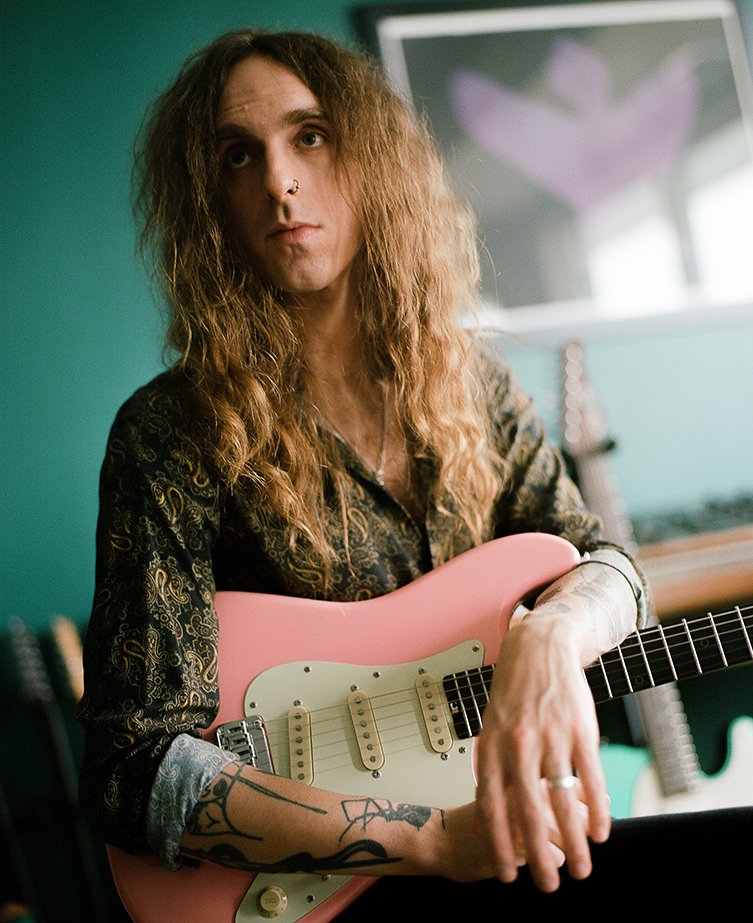
GG: I’m going to take you to task on that: I don’t think it’s lazy. I think it’s far lazier to open up a tab book and just play somebody else’s music, right?
NJ: Haha, maybe you’re right! Maybe you’re right. It causes problems too, because when people ask me ‘can you show me how to play that solo?’ from one of my songs, I have no idea. I don’t know! It was seven or eight years ago and I don’t know it, so there’s that too.
GG: When you record your solos, is a certain amount of each one composed and a certain amount improvised?
NJ: All improvised.
GG: When you play your older songs today, would you then improvise something fresh over the same section?
NJ: Yeah, yeah, I wouldn’t know what I’d originally played. I’d have to sit down and deconstruct it, I guess. I’m sure if you think about you yourself playing guitar seven years ago: would you want to play what you used to play?
"If I played these minor chords in succession, most people would think, 'Oh, it sounds like a Tim Burton movie'. Well, no: it's just minor chords! We know it as orchestral music but it can still be guitar music!"
GG: I know what you mean! You hope you’ve gotten better, but there are some bits that just work, and you look forward to playing them again. Maybe that’s the more melodic elements.
NJ: Yeah, that’s fair, for sure.
GG: You’ve kind of answered this, but I’ll expand a little bit. One of the things that I enjoy - and I’m understanding you slightly differently now from having this conversation, because I was kind of expecting you to be following a fairly typical quote-unquote instrumental guitar guy routine and you’ve subverted that quite successfully for me…
NJ: Oh cool, hahaha!
GG: Yeah, I’m really interested in your approach! But yeah, one of the things I find refreshing about your music is the amount of space you put into the arrangements. You’re not constantly throwing notes at the listener, be it on the guitar or keys. You allow a lot of space, which isn’t very typical for a guitar player. Do you see yourself more as a composer or as a songwriter? I was gonna say ‘or a guitarist’, but I tahini we’ve covered the fact that that isn’t really the case with you!
NJ: Umm, I guess I feel very awkward calling myself anything other than a guitar player. I mean, I feel like I haven’t quite figured out what I am yet.
GG: Okay.
NJ: I feel like the next ten years or so will clear that up. I’ve been playing for twenty years now, and for me, the first ten were just figuring out some nuts and bolts, like, ‘what am I doing here?’ and the ten after was releasing music, trying to find a voice, stuff like that. Now, it’s all about the tools that I have: what can I do and how can I elevate what I’m doing? That’s scary because a lot of times it involves completely removing things that make you comfortable, and chord changes and melodies that you’re referencing. I don't know what that’s gonna mean, like, am I gonna be using guitar more? Am I gonna be using other instruments? I have no idea. All I can say is: right now, if you were to ask me to classify myself, I’m just learning. I don’t know. Because what’s great about that is, you sidestep my greatest fear with it, which was peaking early (laughs). That was my biggest fear during my first record and most people don’t know my first record! I’m fine with that!
GG: What a humble answer! What a delightful, humble answer.
NJ: Aw man, I even feel pretentious saying that but it’s the god's honest truth. I do not feel like I’ve figured anything out. That kinda shit runs pretty deep.
GG: Okay, okay. But you know, bear in mind that I’m halfway across the world, talking to you for a guitar website because of your signature guitars, so you’ve figured some things out!
NJ: Hahaha, Okay, sure!
GG: Cool, now let’s talk about guitars then! How did your relationship with Schecter come about?
NJ: Okay, backstory first. In the late 90s, early 2000s when I first started playing guitar, Schecter was like Nu Metal, Papa Roach, that kinda thing and I wasn’t in that world. I didn’t know Schecter other than the Damien and Hellraiser guitars. I started playing Fender guitars because I could get my hands on them: they were everywhere and I lived in a small town. Fast forward to 2013 I think it was, I was putting out my third album, which was called Atomic Mind, and I had started to build a little bit of a listenership. I don't even want to say fanbase, and I’d get the off email from this guitar brand for that guitar brand. Sometimes it’s not the right fit, even if it’s the biggest guitar company in the world. I felt that, but that’s a whole other story (laughs). I got in touch with two guys who were Schecter artists. At the time, Jeff Loomis was still with Schecter and we started talking. Another artist, Keith Merrow, they both introduced me to Mark, the top brass at Schecter. They had a guitar sent out for me to try. My only stipulation was that it be a nice guitar: it didn’t want to be endorsing a guitar with fret ends that could slash your fingertips when you play them. So, I left it to sit in its case; I was like, ‘Aw man, this is gonna be a hunk of shit! I was terrified! So Mark said, ‘If you don’t want it, send it back, or play it’. So, I finally played it and it was by far the nicest guitar I’ve ever played. By far.
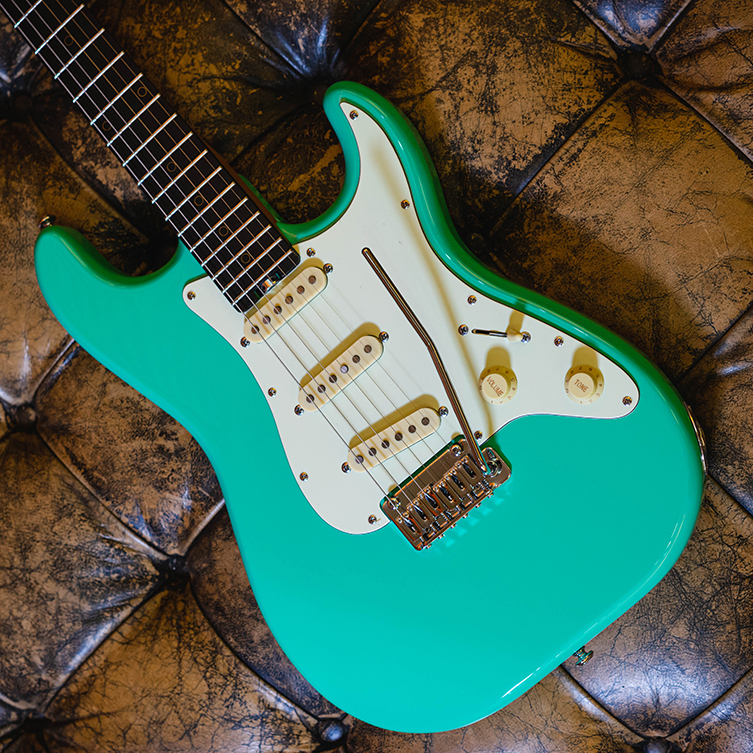
So that’s how it started. Schecter are one of the few companies who really push the clinic world, and they took me on a clinic tour of a bunch of Southeast Asian countries. The reason that was so great was that it went from cold, Canadian weather to very humid, y’know, Thailand weather! The guitar stayed in tune fine, so I took that as a sign! That’s the guitar! Then a bunch of shit happened and immediately, just because of where I was at the time with my career and everything - nobody was really playing a Strat in my instrumental guitar world, you know, the new graduating class of Plini and all these guys - Schecter said to me, ‘Hey, we’re gonna reboot the Custom Shop, more or less, and we want you as the poster boy’. A few months after that, they asked if I wanted to do a Nick Johnston signature guitar.
Beyond all that, the guy who - we’re talking eight years ago - the guy I went out on clinics with, who really helped me get to this position, we’re about to go out again next month, so we became best friends. It’s a really unique situation, because part of the reason why I get to do it so much is because we have a really good time! It’s good business and the guitar sells great so that’s good.
Then, it went to ‘we can only make so many of these each month’, because the custom shop is only three guys, so what should we do? Let’s try and do a Diamond Series model. And here we are!
GG: That’s really interesting! I didn’t realise there were so few people in the Custom Shop! Also, I’m more familiar with your Diamond Series instruments because we keep a range of Nick Johnston guitars.
NJ: Yes, the orange one was exclusive at first for you guys, hence the colour! That was the guitarguitar model.
GG: Indeed! I see, from looking over your shoulder there, that it’s mainly Strat-type guitars you play. Do you go for a Les Paul or an SG too? Does anything like that ever interest you?
NJ: No, I’m all good, haha! I got to design every bit of it, it’s the guitar for me.
GG: Okay, let's talk about that, then. If we start with the canvas of…I have to call it a Strat because that’s the kind of language of it.
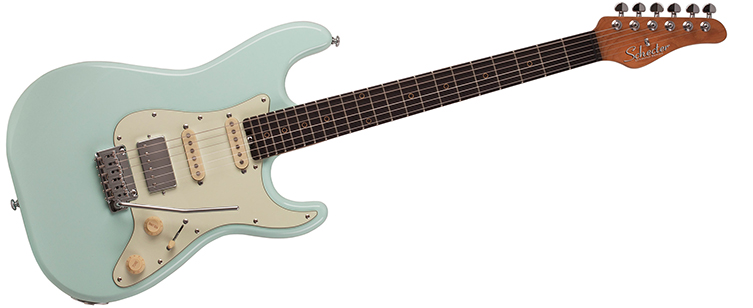
NJ: Yeah.
GG: You have the Strat: what about the Strat did you change to make it more how you wanted it? Are we talking about electronics? The radius? You mentioned fret ends…what is it that makes that guitar your guitar?
NJ: The neck dimensions, I love the unfinished wenge. It’s 14” all the way. From all the travelling I was doing, I found it hard to adjust the neck, so we put that wheel at the bottom to make it easy. Didn't need a master tone: what’s the point? (laughs) You know, it’s basically just a modern version of the tried and true. I also find that where the horn cut is, it plays a little better higher up. The bridge is the custom shop bridge, it’s fucking beautiful man! And I got to design the pickups, so everything was like, ‘I don’t wanna mess too much with the S-style guitar, but I wanna try something’. Nothing to scare the sound away: I wanted to keep that because I love the sound of a Strat, of course. And then, here's the thing: the idea was not that anyone would get one, because the first one I got was just for me! When I started working with them, I went to the custom shop and one of the guys said, ‘Whatever you see, you can have. We’ll make it for ya’. There was a wenge neck with the board on it, and I was like, ‘what the hell’s that?’ There was an old body in a box and we held this dark neck up to this green body, it was like ‘wow!’. It was just for me, so they put the pickups in, put the input jack on the bottom, just made it for me! Then everyone seemed to like it, so.
GG: Loving it man!
NJ: And the guitar I use is the same damn thing you can get at your local guitarguitar!

GG: There you go, there’s the advert! So, one thing I was going to get to is: Schecter Diamond Series is a really high spec, well put-together guitar anyway, but there’s a couple of new USA Custom Shop ones. So you have them both: do you use them both and how does one compare to the other, given that there’s a huge price difference?
NJ: The Diamond Series to the Custom Shop you mean?
GG: Yeah. I know it’s a slightly unfair question but it’s worth knowing what you make of the comparison.
NJ: I find I use whatever the newest one they send me is! (laughs) I get so excited about a new one. They sent me the Orange guitarguitar one, the Diamond Series, and I used it all Summer. Because I haven’t been touring for years because of the pandemic, I haven’t really been worried about having guitars tuned for certain songs, I just play them. But ultimately, it’s like anything: if you buy a handmade guitar, you’re gonna have that attention to detail in the instrument, versus if you buy one with a little bit of machine tuning with humans at the end giving it it’s final magic dust. They are two different instruments, but there’s enough in common to where you can see the shared DNA. I mean, of course, if you look at the price point, it’s a big difference.
GG: It’s a big difference.
NJ: And that’s reflected in the guitar, it really is. Plus, I mean, if you try to do the Wenge neck with an Ebony fingerboard and handwound pickups on any guitar, the price would immediately shoot through the roof!
GG: True!
NJ: We do our damnedest to make it work.
GG: Totally. Again, it’s not a fair question. Why compare something that’s £800 to something that’s £4k, but you’re using them both for the same job, it’s like: how do you find them? You seem to be able to use both quite happily.
NJ: They’re great, and there’s a reason why the Diamond Series model has been successful. It’s because some people prefer the feel of the neck over the other one. It just depends, I guess.
"Since I've been able to record, writing's been everything."
GG: Also, a lot of guitarists don’t want to take a £3-4k guitar out to gigs where, if there’s something relatively similar for £8-900, it’s a much safer proposition, right?
NJ: A very good point, yeah. Protect your investment!
GG: Haha! So, are you typically in E standard tuning?
NJ: Uh, I have been in the last little while. All my albums are Eb tuned, everything I’ve ever released has been in Eb. I’m playing a lot more piano now so it makes sense to have the two instruments in standard tuning.
GG: And what is your preferred string gauge?
NJ: What am I using right now? I don’t know! I think it’s just the balanced tension NYXL ten gauge, 10-46. I switched to 9s for a minute because I was having some hand problems a few years ago, but it was almost too slippery.
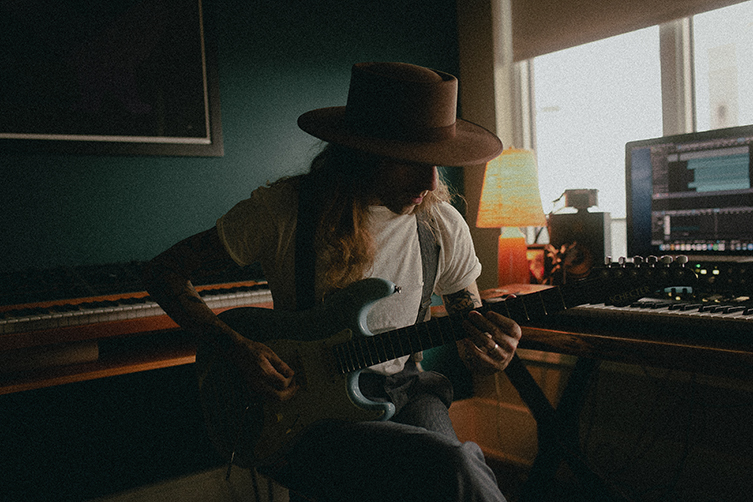
GG: Yeah, totally. And what about picks?
NJ: It’s the standard green .88mm Tortex. I’ve used that pick since I was 14. I saw an issue of Guitar World with Kirk Hammett on the cover with an article called Lord of the Strings! He had that pick. Boom, there you go!
GG: Influential after all! Kirk Hammett!
NJ: There you go, you know!
GG: What about the rest of your setup? I guess it’s different for recording, gigging and clinics, but do you have a preferred amp and pedalboard that gives you most of what you need?
NJ: I started with Orange before the pandemic, so I’m looking forward to trying their stuff. At home, I just play direct: sometimes I use a Kemper or just whatever plugin is there. Just something for a simple signal. And for clinics, just whatever’s there!
GG: Cool!
NJ: And I don’t have any pedals.
GG: Oh, really? Just straight into the amp?
NJ: I did have one, but I moved not that long ago, so whatever I had left, I don’t know where they are! (laughs) Just straight into the amp.
GG: I love it man, haha! I do a lot of these and this is such a nice, refreshing attitude. I’m really enjoying it!
NJ: Great man, that’s awesome!
GG: So, two more questions. One is, are you working on any new material just now?
NJ: Yes. I have a new album written, which I’d like to record when I find a hole in my schedule. I have a project that I do called Archival, so we’re recording our second album in a few weeks, writing the third and I’m actually doing something with my wife as well. I’m very busy, and that’s a beautiful symptom of not having to tour: I can just be here and be creative. Touring sometimes tends to bleed me a little dry in terms of inspiration and stuff. Now that I’m at home, I can sit down here at the same time every single day and just try stuff.
GG: That’s a great work ethic! I suppose you just build up a bunch of material and then cherry pick your favourites?
NJ: Yeah, I just write until I think I’ve gone too far and the new stuff is not working. I then cut it back and then just kinda know when I have something to say again, I guess. Again, I can’t stress how important sitting here every day and working is, because the output almost becomes hypnotic. Every day I have stuff. It’s reached that point again where I can just focus on creating, it’s beautiful! It’s what I always wanted.
GG: That’s awesome! You’re truly living the dream, to use a kind of horrible quote haha! My final question related to your unorthodox note choices, in a very good, creative way! I really admire it. I was gonna ask you if you have any tips you can share for people reading this to kind of get away from their familiar playing habits and shapes they fall into?
NJ: Yeah, well first thing I can say is going off the back of what you mentioned earlier about how it’s not common for guitar players to kind of shut up, because if you can breathe, you can just play an endless stream of notes. I find you have to give yourself a little bit of a task sometimes. I’ll give you an example: I must have been 17 or 18 and I had this friend who was quite a bit older than me, he was a teacher at this place I used to go and hang out sometimes. I used to take him demos of what I was working on because I really respected his opinion. I was young, right?
I took him this stuff and he goes, ‘Wow, really good playing but your songs: I’m worried you’re gonna become one of those Shrapnel guys’ and I was like ‘Oh, he means Shrapnel Records!’ (legendary home of 80s shred records - Ray) But no, he means just another shred guy. At the time, I couldn’t really know but what he meant was, there was really no melody there. All I was doing was showing what I’d been working on. So, he gave me a task, which was: come back tomorrow with a new solo with no solo. So I came back and I just played melodies and figured out how to properly support them. It changed everything. Changed my life.
GG: Wow, that’s great!
NJ: I realised I’d been using all this technique and shit to get attention and approval, but it didn’t matter. It was like, okay, now what? We know you can do that, it’s really cool.
GG: That word ‘approval’ is it, that’s exactly it.
NJ: Yeah, that’s what it’s all for! What is this Instagram shit for if not approval? What the fuck is it for? Honestly! (laughs) Seriously, think about it!
GG: Of course it is!
NJ: Yeah! So anyway, I won’t get into that, it’s a whole other conversation, haha! You can print that or you can bury that, I don’t care, but the thing that changed everything was: put down your proverbial weapons. What have you got? What kind of conversation can we have? That whole thing, it got me thinking differently. Don’t do a solo! In fact, even now, the solo’s never the centrepiece. It might seem like it is, but, swear to god, when I’m writing these songs, I just think: ‘can I get away with no solo for this song?’ And if I can, get it out of there! It’s not doing anything!
GG: I love it! And again, it’s not what I expected from you at all, but in a good way!
NJ: I totally get what you're saying! (laughs)
What a fun conversation that was! Nick really turned my expectations upside down, and I found his take on composition to be inspiring, not to mention his attitude to the guitar’s position in his music. It’s clear that he loves the instrument, but he loves music more and that seems like the right perspective to have.
Nick, as you’ve learned, is a busy man, so head over to the official Nick Johnston website to keep up to date on all of his ongoing projects.
We’d like to thank Nick for his time, candour and good vibes throughout! Thanks, as always, to yourself for reading this article! We have many more like it over in our guitarguitar interviews section, including exclusive conversations with Steve Vai, Joe Satriani and more!

